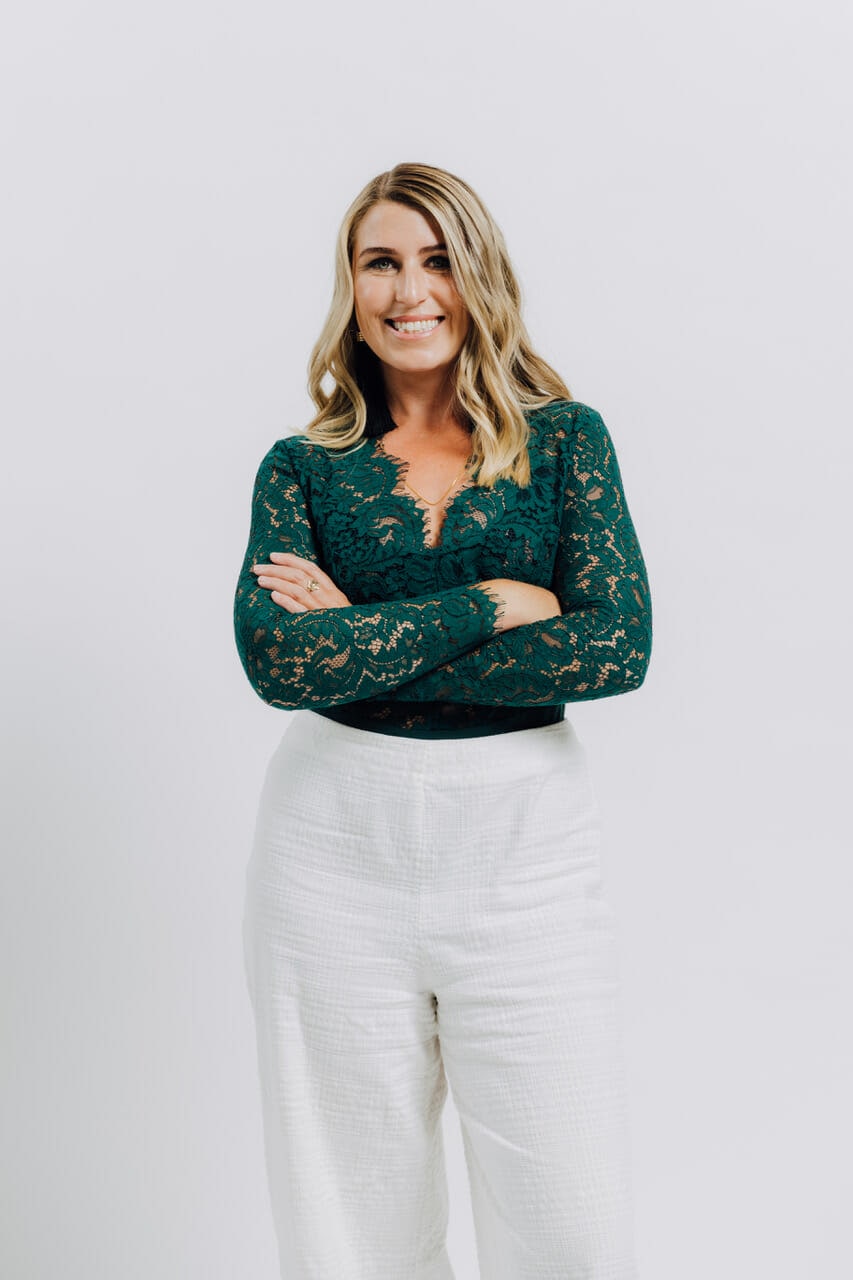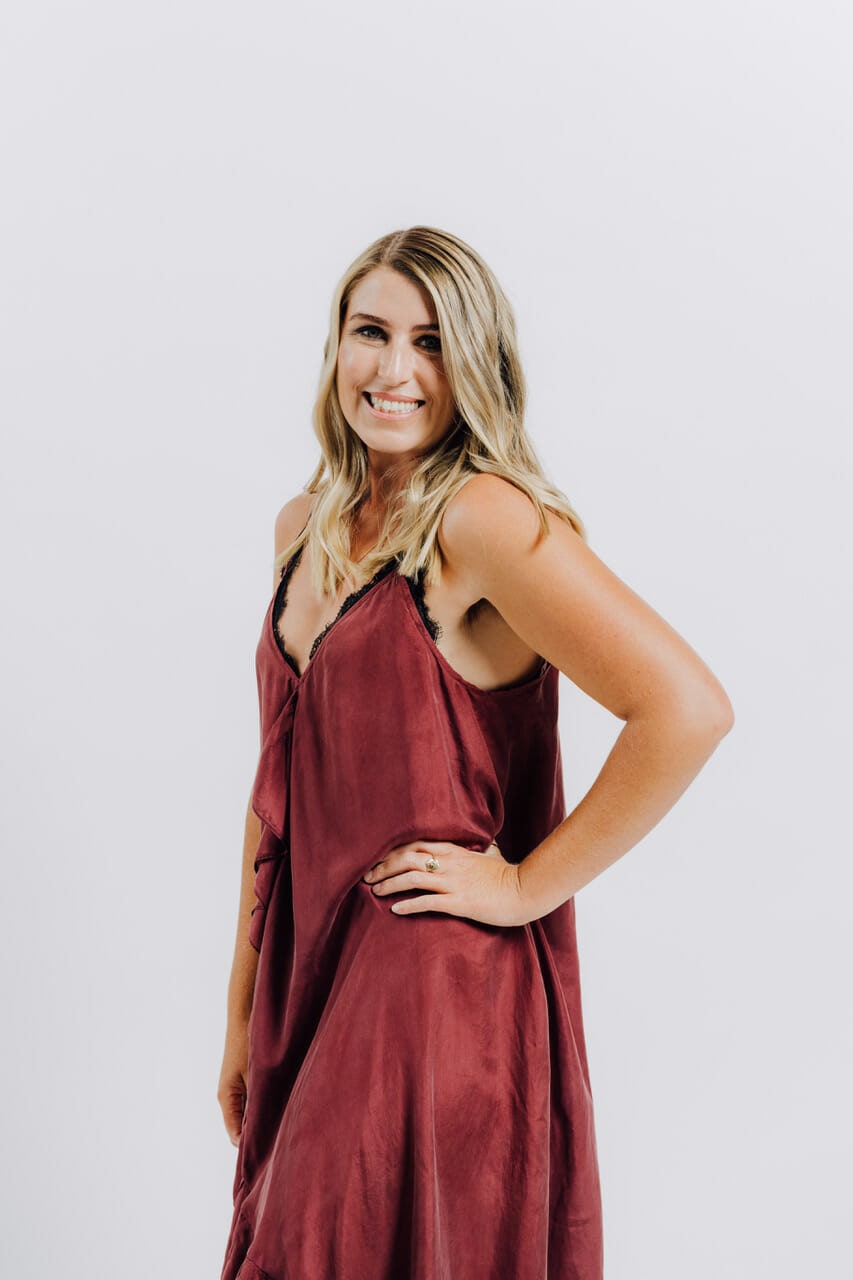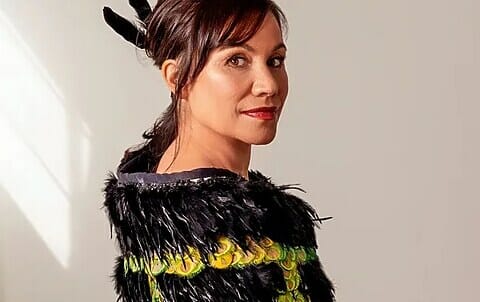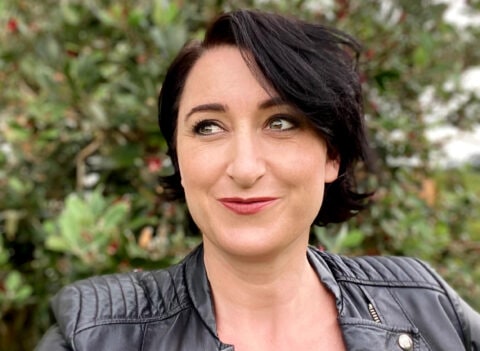Morgan Penn has a unique job title: Somatic Sexologist.
Soma is the Greek word for body. Somatic means to “work with the body”.
She helps women and “vulva owners” build confidence on how to navigate their bodies better so they can have mind-blowing sex – with themselves, or others.
Sexologist Penn is a pleasure advocate, sex educator and co-host of the award-winning podcast, The Trainee Sexologist alongside The Edge’s Sharyn Casey. On the show, they chat about whips, vibrators and how to have the best orgasms of your life. No topic is taboo or untouched (so to speak).
I ask to catch up for coffee with Penn in Auckland for an interview – to ask what she does in her job. We follow each other on Instagram. So, I slip into her DMs.
She calls our interview a “date” and says “I look forward to connecting with you in the flesh”. I blush, of course, but thankfully she cannot see that via our digital chat.
She turns out to be as gorgeous in the flesh, as she is in her photographs. She looks younger than her 36-years. The secret, she reckons, is “living a pleasure-filled life” and so “my skin looks good”.
Penn is also smart, fun, funny and a professional communicator.
The latter should not be a surprise. Her background is in media (for 15 years she did sales and marketing mostly), life coaching and embodied counselling.

She decided to train to be a sexologist four years ago.
“I loved my job in media, but I wanted to do something where I could be more in-service and help people.
“I was the person in the office who others would divulge all their secrets and I would hold no judgement.
“I’ve always been intrigued by sex, why things were taboo, and I was also the one in the friend group to spill the beans on my action at the weekend.
“When someone is open, then it gives a permission slip to others to share and own their own stuff instead of feeling alone and shameful about what they might be experiencing”.
Sexologist Penn was going to do the psychology side of this profession initially, “but it became clear to me that I wanted to work with the body as well”.
“I find it really helpful when working with people with trauma… There’s only so much you can do with repatterning with the mind. Things can get stuck in the body on a cellular level that needs to be sequenced through and acknowledged”.
She trained mostly online, but then did some hands-on learning in Byron Bay. She was nervous at first but soon understood this was necessary.
“I had to experience it on my own body, so I had a felt experience of everything because you don’t want to be doing something to someone that you haven’t experienced.
“You need to know the slowness of the breath. You have to have the embodied experience of it to really integrate.”
She credits her mum for helping to lay the foundation of self-love, self-confidence and self-worth and having free expression of the body.
She grew up in a household where her mum “talked about bodies”. So, chats about sex were normalised in a safe space from an early age.
She was inspired to become a somatic sexologist by someone on Instagram who was talking about things like “womb connection”. This inspired her to go on a journey of “figuring out my own body”.
She learnt she needed to be more mindful about her life as the stress in her life was having a big impact on her body. So, she quit 5am gym sessions and suppressing period pain with painkillers, to live a life instead where she learned to “listen to my body and chill out”. She came to realise when you are highly stressed there is a ripple effect with your body.
Penn’s clients are roughly aged 25-45 generally, but she has also helped a 65-year-old. She sees women on their own in person or online. She has even seen a mum and her three daughters. It was one of the daughters who found her first.
She also helps couples, or men on their own, strictly online (for safety). Clients come from throughout New Zealand, Australia, Britain and even France.
Her service of yoni mapping is one of her most sought-after services and has a waitlist. Clients travel internationally for this.
Yoni is the Sanskrit word that translates to “sacred temple/divine passage and source of all life and is used to describe the entire female genitalia and reproductive system”. So, women learn the womb and vulva anatomy (glans clitoris, labia major, labia minora, prepuce, urethral opening, vestibule, vagina etc).
Women importantly learn how they want to be touched under Penn’s expert guidance. They learn how they can escape numbness, or tension, trauma, stress and go from experiencing pain to feeling pleasure.
“Some people come to me and say I’m just dead down there. Most can’t believe how much sensation there is when you go slow with consent and intention”.
Yoni mapping is a 3-hour instructive session that is hands-on, but not sexual. It is done at a client’s individual pace in safety and with consent throughout. Women learn the map of their bodies and the places that bring them pleasure from the G-spot to a list of erogenous zones (there are too many to name).
Penn helps guide women with touch, and consent, on their genitals and internally to help them learn.
“This brings women back into their bodies and gives them a sense of direction and laying out a map for them.
“A lot of women haven’t felt slowness and that awareness with their bodies. When there’s touching, I’m educating them. They feel it themselves.”
This might be seen as body work. But it is more heart and mind work for Penn.
“It’s about people getting in to their (own) body. It’s mainly the mind that is blocking people from orgasms”.
After the yoni mapping session, a client is sent away with “home play” (aka homework) on how to self-pleasure themselves. She often gets “excited emails” later.
What is it like to help women have orgasms?
“Write it on my headstone. It’s a big accomplishment. It’s life changing for people. We are talking about real pleasure. For a lot of women, they have felt they have been missing out, or faking it for years…
“It’s one of my favourite things when I get these excited emails from clients.”
Penn believes almost everyone can orgasm. About 4% cannot orgasm due to nerve damage or nerve structure.
One of the issues with Kiwis is being “prudish”.
“We are so disconnected. They (women) know they have a vagina mostly.
“To have an awareness of this is so important and how to
touch themselves and pleasure themselves.
“This should be in our curriculum and so then people would stop outsourcing pleasure.
“You don’t have to do this with anyone else. You can do it by yourself.”
It is important to know your body too so you can notice health changes.
Sexologist Penn says your sexual health is linked to physical health.
Orgasms release feel-good hormones that make you feel happier and less stressed like endorphins, serotonin, and oxytocin.
You need to “use it or lose it too”. Your vagina can atrophy with age and clitoris can shrink back over time. Keeping your pelvic floor muscles strong and active are helpful for having orgasms too.
Penn hates that the media dictates what orgasms look like, usually hot, instantaneous, usually with someone grabbing or being thrown against a wall and “a woman being ready to receive a penis in the first five minutes”.
In reality, it actually takes about half an hour for “that whole area to come online” (i.e. for a woman to be connected, engaged, excited and ready for penetrative sex). We have a different makeup than the male with arousal.
“When people come to me with pain. They may have been only taking five minutes to prepare (for sex).
“And how we treat ourselves with pleasure is often what we will put up with in partner sex.
“If we are tapping and gapping with ourselves, why would we demand more with a partner?
So self-pleasure should be a priority with yourself – and when you are in a relationship too.
“Bring that mojo back, awareness back to that area. If your body can orgasm with just you, then you can remember that with others and go to that place again.”
Penn’s next most popular service is doing one-on-ones where people come to her with issues like low-libido, mismatched desire, sexual dysfunction, disruptive thoughts like porn addiction or a disconnect with the body.
“Or someone just wants to expand their pleasure or upskill. I love that!”
Sexologist Penn helps people with a guide and framework to upskill on sex. It can be for women new to discovering themselves, or couples who have been married for 20 years and want to escape their routine and learn new things.
Penn also has a service on vaginismus. This is when the vaginal muscles involuntarily contract and stay closed “and so it is nearly impossible to get anything inside i.e. a tampon, or penis”.
This could be due to trauma. It is a psychological condition.
“(Some)Doctors say they should have a glass of wine and relax, or use numbing gel, which is so counterproductive. We need to listen to the body and understand what it’s communicating. It’s a big unravelling piece.”
“A woman came to see me and had never had vaginal sex but wanted to have a baby. After going through my vaginismus protocol, she messaged me some time later to say she was having a baby and showed me the scan. It was so beautiful. I do this work for these moments.”
Penn says Kiwi women are progressive and there is a growing “hunger” for more pleasure.
Her tip is not to get fixated on “the big bang” i.e. the orgasm.
Get curious and discover all the different ways to have orgasms and to better connect with yourself, or someone else.
Ultimately, Penn wants Kiwi women to be able to talk more about pleasure and sex, normalise it and not feel shame, but rather savour the sacredness of it.

“My goal is for society to be able to talk about a clitoris the way they talk about a nose “.
Meanwhile, I’m curious and ask Penn if she has tried everything?
She laughs and tells me “I fell out of a sex swing at Christmas!”
She shares that she has tried a lot of things. She needs to be able to talk about these with clients.
But there are still some intimate ways to further explore for her too, which she hopes to do when she finds someone special to love. She is currently single.
“There’s a part of me that’s still waiting for my person who I can surrender to completely.”
“My heart’s desire is to nest down with someone and have a little family.
“I won’t freeze my eggs. It’s about co-creation with love and life and doing that journey with someone.”
For now, while Penn waits to meet her Mr Right, she is content with self-love. She gets pleasure too from bushwalking, deep connections, coffee, learning new things, te moana (the sea) and dancing in quiet places.

Tips for Pleasure from a Sexologist
Firstly, know that there is more. Start your journey with reconnecting back to yourself.
Change things up with masturbation. Bring sacredness into the act. If you do it with one position with yourself, then change it up.
Try different things. Try a new thing two or three times too before knowing if you enjoy this, or not. It can feel different due to you being tired, stressed up or upset. So, you might enjoy something new if you try it a few more times.
Use music.
Light a candle.
Ask what you really need or want. “Is it a long smooch session? Or a long hot shower with yourself to get into your body.”
Make sex a full body experience. Self-pleasure is about more than just the genitals.
Take a moment with your body to let an orgasm land and realise that that was a really nice time and let that goodness flow through the body.There are so many things we must do in life that are mediocre, and sex just should not be one of them.
Have presence. Connection with the heart gives a deeper connection.
Learn to surrender so you can orgasm more easily.
Find ways to “down regulate” i.e. shake stress by doing things like breath work, singing or something enjoyable etc. So, you can orgasm more easily.
Stay curious
Related article: I didn’t hit my sexual stride until I turned 50 – here’s how to kickstart yours








